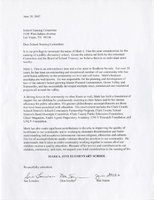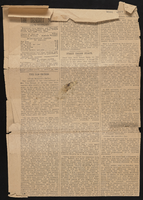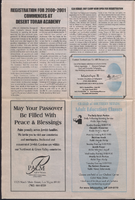Search the Special Collections and Archives Portal
Search Results
Levy Family Papers
Identifier
Abstract
Collection is comprised of scrapbooks, photographs, awards and certificates, and ephemera mainly dating from approximately the 1950s to 1970s gathered by the Levy family of Las Vegas, Nevada. This collection documents the personal and professional lives of three generations in the Levy family: Harry C. Levy, Al Levy, and Andrew “Drew” Levy. Materials in this collection also include photographs and clippings about the Levy Realty Company and about the various public positions held by Harry C. Levy, such as Las Vegas city commissioner.
Archival Collection

Transcript of interview with Christopher Maestas by Claytee White, September 14, 2008
Date
Archival Collection
Description
Christopher “Chris” Maestas (1965-2009) was an engaged educator and leader within the Chicano, Latinx, and Henderson communities. As he traced back his Latinx heritage, he explored his father’s hometown in Llaves, New Mexico, where he and his family were discriminated for their non-white demeanor; and his mother’s paternal Spanish roots; his grandfather came to work in Henderson, Nevada at the Basic Magnesium Industrial (BMI) plants during World War II. The Chicano and Spanish cultures played a significant part in defining his role within the community. For Chris, Chicanos were “people that lived in the southwestern United States particularly southern Colorado, New Mexico and northern Arizona that were originally Mexican citizens before the treaty (Treaty of Guadalupe Hidalgo) was signed and then after the treaty was signed they became Americans.” In this interview, he dives into the difference between Chicano and Spanish cuisine and gives his own tips on how to make Spanish chile relleno. Chris discussed what life was like in Henderson living in Henderson Camp when his grandfather emigrated from Spain in 1943. He described the evolution of the Henderson community in the 50s through his parents’ experiences living in the Hispanic communities of Victory Village and Carver Park. During his childhood in the early 70s, Chris recalled living in Henderson when it was known as Basic and living in a small town-site house. One of his most special recollections was from the summer of 1980, when his family purchased their first set of air-conditioning units. As a passionate teacher and 1984 alumnus from Basic High School, he advocated student engagement as Student Council Advisor. Chris was also an active member of the St. Peter the Apostle, Catholic Church, Knights of the Columbus group and LUPE (Latinos United for Perfect Equality) Club. The LUPE club promoted equality for the Hispanic community and family values. Chris described their Saturday picnics at BMI Park and the annual Henderson Industrial Days festival.
Text

Interview with Louis Francis Wouters, May 20, 2004
Date
Archival Collection
Description
Text

Transcript of interview with Judith D. Steele by Barbara Tabach, November 24, 2014
Date
Archival Collection
Description
In this interview she talks about student teaching in East Harlem, her teaching experiences in Providence, Rhode Island and the decision to reside in Las Vegas. When she was finally able to be promoted outside of the classroom, among her highlights was being Director of Special Education Programs and Services for the Clark County School District. In 1991, she served in a dual role as Manager of the Office of Development and Education Improvement for CCSD and Executive Director of the newly incorporated Clark County Public Education Foundation, an independent, non-profit organization established to improve public education in Southern Nevada. Among her many community activities is serving on numerous board and founder of the Henderson Arts Council.
Text

Transcript of interview with Ronald Bananto by Eric Henninger, March 15, 1981
Date
Archival Collection
Description
Text

Application and supporting documents for the naming of Mark L. Fine Elementary School, 2007
Date
Archival Collection
Description
The application and supporting documents provide details about Mark Fine and his contributions to Clark County and Las Vegas, Nevada. There are letters of support from many members of the community, including his children and elected officials, and from leaders in religious groups, non-profit organizations and business enterprises.
Text

Mach and Arlene Manuel oral history interview: transcript
Date
Archival Collection
Description
Oral history interview with Mach and Arlene Manuel conducted by Kristel Peralta and Stefani Evans on June 28, 2021 for Reflections: The Las Vegas Asian American and Pacific Islander Oral History Project. Mach and Arlene Manuel share the story of their overseas courtship and how they came to be together in the United States. Arlene was raised in the Philippines while Mach was born and raised in San Diego, California. Mach describes his visit to the Philippines as an adult when he began to connect more to his Filipino heritage. The couple shares how they dated for 13 years before Arlene moved to San Diego, and how the Manuel family came to live in Las Vegas in 2017 to pursue Arlene's nursing career. Arlene and Mach talk about cultural differences and discrimination, emigration and diversity, religion and identity, and Filipino food, among other topics. Subjects discussed include: Manila, Philippines; discrimination of class; and anti-Asian hate.
Text



